I once had a dream: A dream that I would beat every Final Fantasy game ever made.
I later realized that was a bit silly, so I revised it to beating all of the main numbered Final Fantasy titles. I’ve recently reached a major milestone on that list: Having recently finished Final Fantasy VIII, I’ve now beaten every game from Final Fantasy I all the way through Final Fantasy X. I’ve probably sunk a good couple hundred hours of my life into this franchise. Ever since playing Final Fantasy II and III on the SNES (which were actually IV and VI, but that’s another story) this franchise has been a near-constant presence in my life.
What I’m saying is, this article has been a very long time coming. So without further ado, here are my personal thoughts and rankings for Final Fantasy I - X.
#10: A Good Attempt, But A Deeply Flawed Game
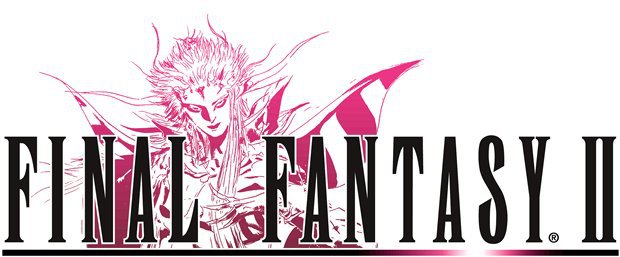
Coming in at the bottom of the list, Final Fantasy II is a game that suffers badly from sequelitis. It’s very similar in tone and plot to Final Fantasy I, and the things that were changed simply don’t work well.
Final Fantasy II broke away from the level-up system and instead introduced the idea of weapon and spell levels. The more a character used a certain type of weapon or spell, the better he or she got with it. On the surface it seems like this would be a good way to promote individual character growth and specialization, but what it really meant was that you had to grind each individual spell for it to be any good.
It wasn’t such a problem with weapons as long as each character picked a weapon type and stuck to it for the entire game - although that had its own problems when you would find an amazing weapon that nobody was proficient with. However, it was incredibly frustrating to get what was supposed to be the strongest spell in the world, only to have it deal kitten farts of damage.
Speaking of grinding, be prepared to do a lot of it. Final Fantasy II has a few sudden and very large spikes in difficulty. I particularly remember having a lot of trouble with a boss (the Adamantoise) then going to the next area and running into that same monster as a random encounter. FFII also likes to use the monster levels as a sort of gateway check, meaning that if you make a wrong turn you could be instantly wiped out by a creature that’s way too strong for you. Add on top of that a whole lot of dead-end rooms with almost 100% encounter rates (that is, you’ll run into a monster on nearly every step) and you’ve got one extremely frustrating game.
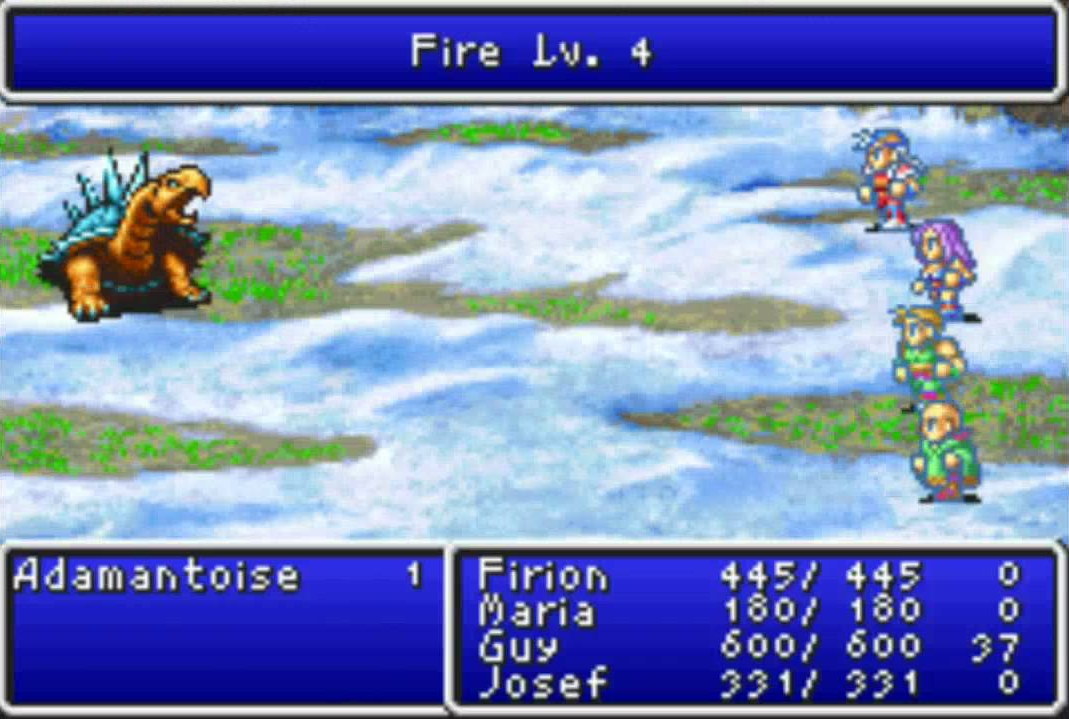
This thing. I freaking hate this thing.
Also annoying was the addition of a sort of investigation system, where in order to progress the story you had to find certain keywords in conversations with NPCs, then ask other NPCs about those words to figure out what you had to do next. It was like the precursor to a Phoenix Wright game, and as much as I like that series, it’s totally out of place in Final Fantasy. It mostly just led to a lot of running in circles looking for the right person to talk to, and I was happy to see it taken out in future games.
The one good thing that I can say about II is that it was miles ahead of its predecessor in terms of characterization. As in, there were actual characters who did more than point in the direction of the next plot point. They were still pretty one-dimensional, but at least they had some kind of personality.
Overall, while I appreciate that Square was trying new things and keeping the series fresh, I think it’s fair to call this a failed experiment. Oh, and I learned much too late that the Adamantoise is weak to ice damage.
#9: Please Contain Your Nerd Rage
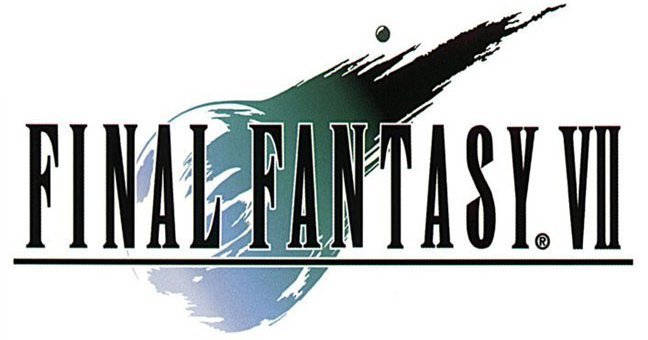
And here’s the part of the article that gets me tarred and feathered and run out of town.
I don’t like Final Fantasy VII. At all. I’ve been told that FFVII was a game for its time and it’s not fair to judge it by modern standards, but there are older games that I think are better in every way except graphics ...like the other entries on this list. Plus I didn’t like FFVII back in the 90’s either, so that argument never held water for me.
In short, I found most of the characters boring and the plot needlessly convoluted. A lot of the mini games felt totally out of place, and any attack animation that lets me leave, make a sandwich, and be back in time for my next turn is way too long (Knights of the Round, I'm looking at you). To see my thoughts in more detail, you can read the article I wrote after beating this behemoth of a game for the first time.
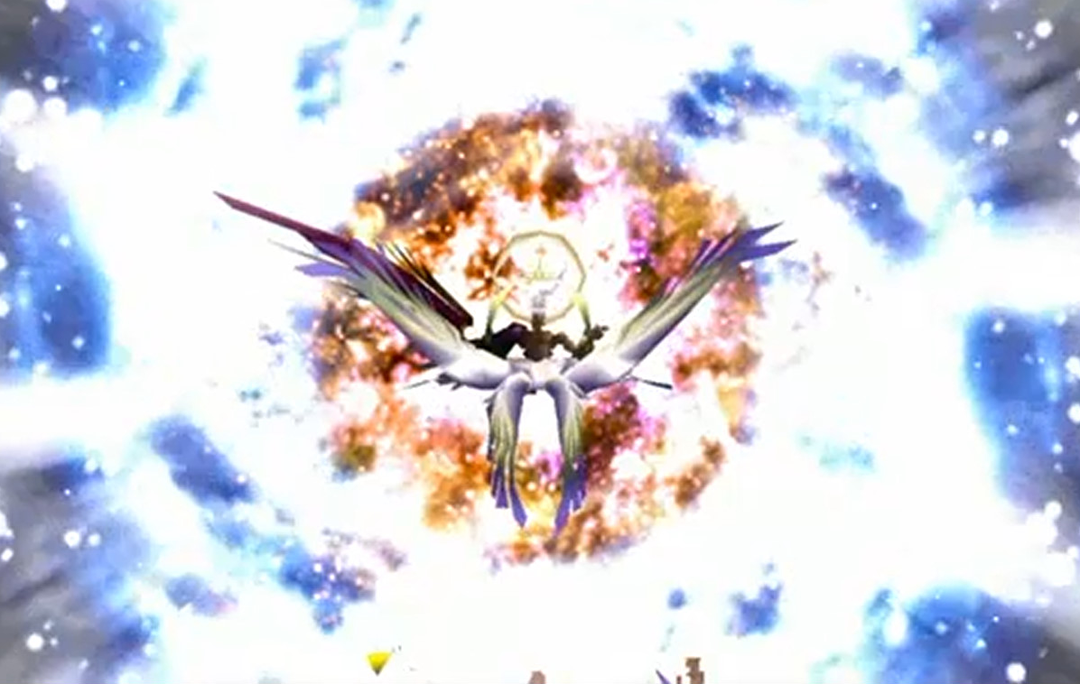
Okay Sephiroth, it was impressive the first time. The third? Not so much.
With all of that said, I do acknowledge that Final Fantasy VII was an important game. It was one of the biggest titles on the Playstation, and a lot of it was Squaresoft (as they were then called) experimenting with the powerful new system. Final Fantasy VII broke a lot of ground for the games that followed it, both in terms of how to design them and simply because it made the JRPG genre much more well-known in Western countries.
Essentially, Final Fantasy VII’s problems come from the same place as Final Fantasy II’s: Squaresoft was trying new things, seeing what they could and couldn’t - and shouldn’t - do. To give credit where it’s due, some of this game’s biggest issues were fixed in Final Fantasy VIII, where they removed the way-too-long unskippable animations and the way-too-many minigames (Mountain-climbing, the bizarre cross-dressing collection game, the whole freaking Gold Saucer). Final Fantasy VII is an important part of gaming history and it led to some great things, but I just can’t get behind the game itself. For a lot of American gamers, it was their introduction to JRPGs. For me, who played out of order, it felt like it had too many rough edges
#8: Fun, But Forgettable
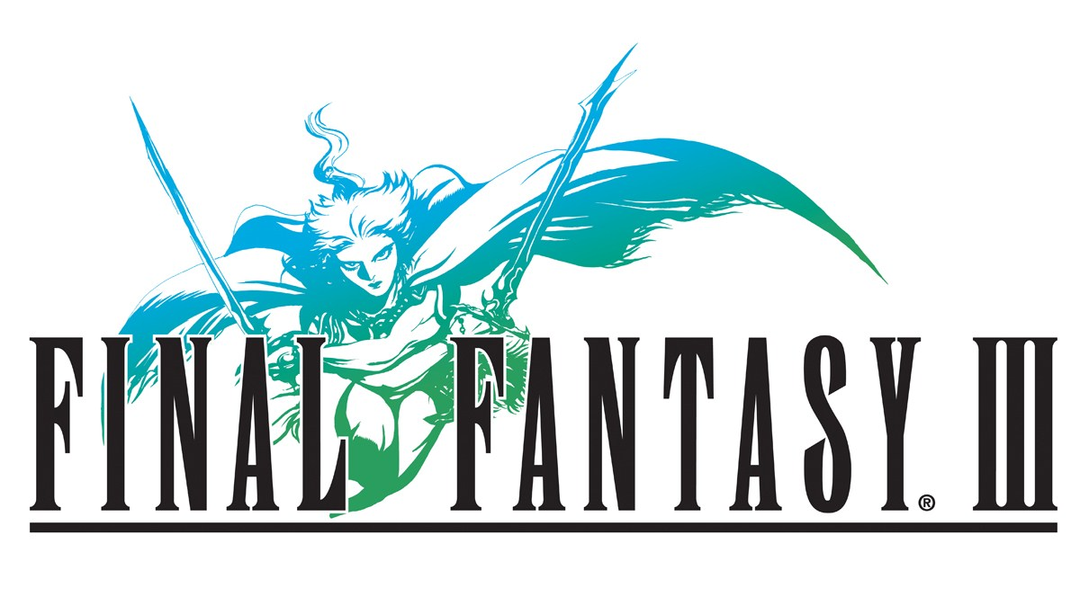
And now, a complete 180 from the last two games. Final Fantasy III was an enjoyable enough game, and its biggest problems were the exact opposite of Final Fantasy II’s: The story by this point had become formulaic, and most of the characters were still the flat archetypes of the previous games. “Something something Crystals, something something Darkness. Go forth, Noble Heroes, and save the world!” It wasn’t bad so much as just unmemorable. The one thing I do remember clearly is that the final boss was extremely easy. I got to the point that I was just starting to think about using my Elixirs and other rare items, and then she died.
On the other hand, Final Fantasy III did some things that I really like. For one thing, they did away with that godawful weapon and spell level system and brought back regular XP-based character leveling. For another, III was the game that introduced my favorite thing in Final Fantasy - the job system.
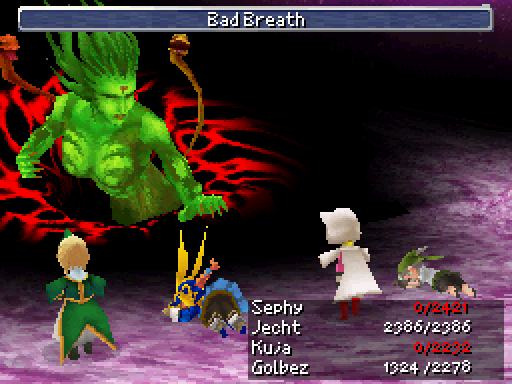
Beware Cloud of Darkness's most terrifying attack: not using mouthwash.
This is character customization done right. There’s no need to grind each individual spell and weapon, you can just pick the job that you want and start training in it. While Final Fantasy I did allow you to pick your characters’ jobs at the start of the game, FFIII was the first time you could keep customizing and experimenting throughout. According to the Final Fantasy Wikia, with four characters in your party and 23 jobs available, there are a whopping 14,950 possible party configurations in this game.
Overall, though it does suffer from a played-out storyline and forgettable characters, FFI II is classic Final Fantasy goodness with some great new ideas.
#7: Why The H8?
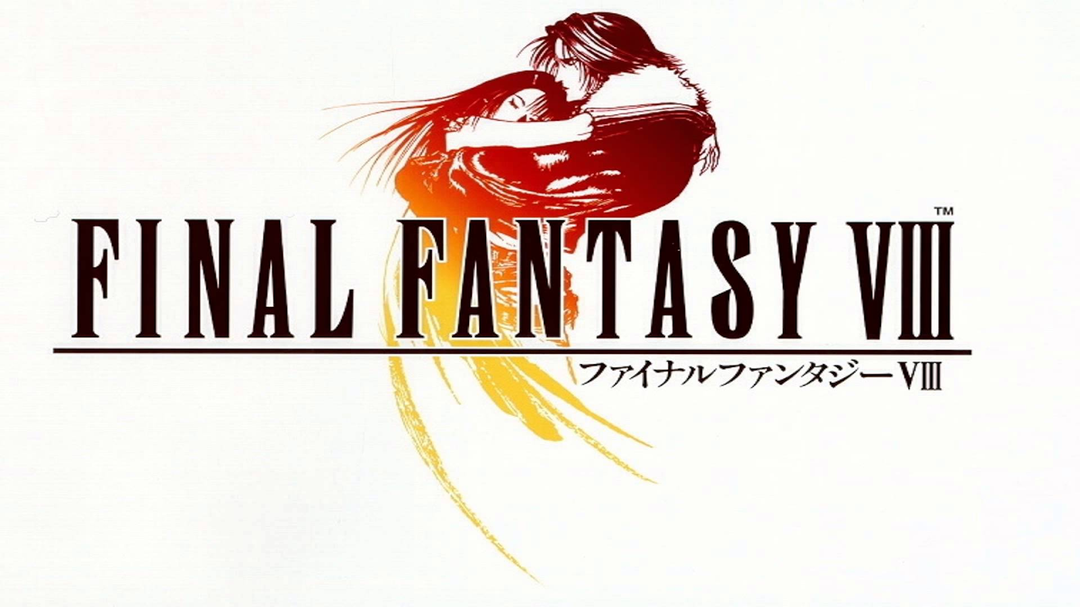
Welcome to Eric's Unpopular Opinions, Part 2!
Final Fantasy VIII gets a lot of hate, and honestly I don’t understand it. The plot is pretty complex and can be hard to follow; it heavily features time travel in addition to already being a Final Fantasy game, so that’s just to be expected. However, the story does make sense once you understand how all the pieces of it come together. The sorceresses, Ellone’s powers, Laguna and Co, and your party of mercenaries all play a role, and while plot twists are a given, what happens to the world and the story comes about logically.
Some of the characters are a bit unlikeable at first, too. Squall in particular acts like all the worst parts of Cloud turned up to eleven. The thing is, FF VIII uses that as an opportunity for character growth. As the game progresses, you start to learn why Squall is the way he is, and he eventually starts coming out of his angsty teenager mode to act like a real friend and leader. That goes for other characters, too. For the sake of time and not giving everything away, I won’t get into every character’s arc here, but suffice it to say that most characters do have one. They have backstory, personalities, and depth. In a word, the characters have substance, which is something that some earlier titles lacked.
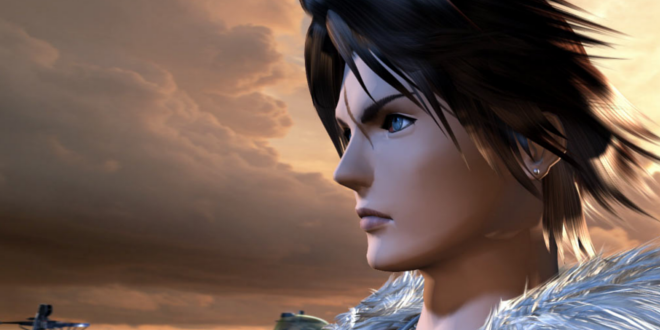
Not to mention, Squall has that "starting dramatically into the distance" thing down.
The game also has excellent graphics for a PS1 title, and the music is as epic as you could want. Just take a few minutes to watch the opening cutscene and you’ll see what I mean.
Now let’s address the enormous summoned dragon in the room: Final Fantasy VIII’s Guardian Force and Junction system. This is so unlike any other Final Fantasy game, and it takes a lot of getting used to. Instead of just raising your stats by leveling up, each character can also equip one or more of these Guardian Forces (GFs for short), which they can summon to do a certain effect (mostly attacking all enemies on screen) then disappear.
However, each GF also lets its user Junction spells to their stats. What that means is that I can, for example, junction Fire to Squall’s Strength stat, increasing his physical attack power based on how many Fires I have stocked on him. What do I mean by stocked spells? That brings us to the Draw ability. Draw allows you to absorb magic spells from monsters and stock them. So, to continue with the previous example, if I find a monster that I can Draw Fire spells from, I can use Squall to farm those Fire spells up to a maximum of 100. Are you lost yet? I think we all were the first time we played FFVIII.
The Junction system is probably one of the least intuitive additions to the Final Fantasy series; it's bizarre, and it takes a lot of getting used to. If Final Fantasy VIII has a downfall, I think it’s that it introduces all of these strange new mechanics and doesn’t do a very good job of explaining them. The game just throws all the information at you in text boxes and sends you off to figure things out.
However, I find that I quite like the Junction system. It makes for easy customization and, more interestingly, it means that using magic can be a tradeoff. Sure, I could spam the most powerful spells I have for massive damage, but I’ll probably be reducing my stats if I do. Can I find more of those spells? Is it worth farming them? Keep in mind that most spells have to be Drawn in combat, so you’ll be getting attacked while you do it. It is a weird system for sure, but it’s an interesting one, and it’s nice to see the series changing things up.
Overall, while it’s not my favorite Final Fantasy, I don’t think VIII deserves the bad reputation that it has. It’s got a learning curve that can be frustrating at first, but the characters and story are good, the art and music are great, and the Junctioning system is enjoyable once you understand it.
#6: A Solid Return To Form

After the more experimental VII and VIII, Final Fantasy IX was a good way to get back to the basics. It was exactly what you’d expect from a Final Fantasy title: An epic quest in a large world, compelling characters, a major plot twist near the end, and a final battle against the Evil-God-That’s-Going-to-End-All-Existence-du-jour. It was also nice to see the usual MP-based magic, and a protagonist who didn’t think he was too cool for the rest of the world.
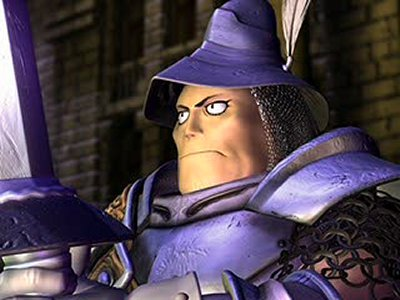
It also has Captain Steiner. Captain Steiner makes everything better.
The one major change here is the Trance function. It’s a bit like Final Fantasy VII’s Limit Break, in that it builds up as you fight and then is used to make immensely powerful attacks. Unlike Limit Break, however, Trance lasts for multiple turns and boosts all of that character’s stats and abilities while it’s active. A well-timed Trance can turn around a tough fight and give you the edge to win. The only problem is that you don’t get to decide when to trigger it: the Trance meter builds up as you take damage, and once it’s full, that character enters the Trance state. There’s no saving it for an emergency and no strategic way to build it up. Still, it’s not meant to be the cornerstone of a good battle strategy, just an exciting twist that can give you a chance if you’re being overwhelmed.
There’s really not a whole lot more to say about it. If you like the classic Final Fantasy approach of a grand quest, a colorful cast of characters, over-the-top enemies, epic battles, and a bit of philosophy about the meaning and purpose of existence, this is a great game where you can find all of that. If you’re not into that kind of thing, then... you’re probably not reading this article.
#5: Where It All Began
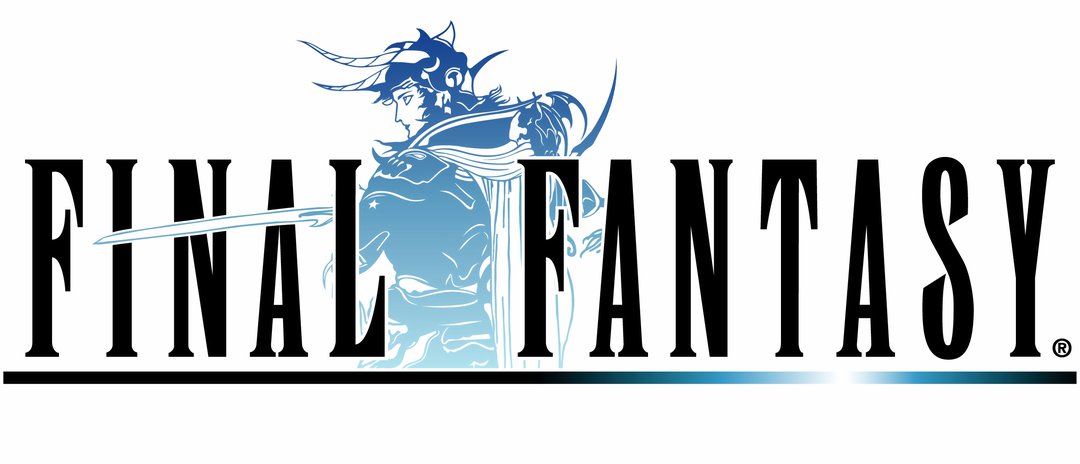
There’s a bit of a legend behind the name Final Fantasy: The story goes that Square was about to go out of business, and the original Final Fantasy was supposed to be their last hurrah, hence the title. It turned out to be an ironic name choice, as the game was so successful that it saved the company and led to the plethora of sequels and spinoffs we have now. It was released in 1987, starting a franchise that almost 30 years later shows no signs of ending. Even today, it’s not hard to see why.
Now, graphics aside, Final Fantasy does show its age in a couple of ways. For starters, the NPCs in the game aren’t characters so much as plot hooks. Everyone you meet just spouts off who they are and what they want as soon as you talk to them. If there’s something that’s too big to be told in a couple of lines of dialogue, you get a cutscene with some scrolling text. Also, in the original release of Final Fantasy, spells were cast using a Dungeons and Dragons style spell slot system instead of the much simpler MP usage of later games. That was changed in the Dawn of Souls remake as an update to modern times.
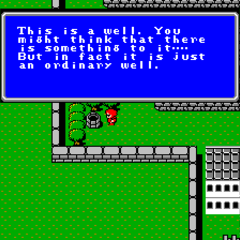
On the whole, though, Final Fantasy has withstood the years surprisingly well. I can’t criticize the plot. While most of the game is the standard “save the Crystals, save the world” fare, I can’t call that clichéd because this is the game that made it a cliché. The final boss was an unexpected twist, and the ending had a heartwarming surprise that really stuck with me. I won’t spoil it for you, but if you don’t plan on playing this one, feel free to look up the final cutscene.
The gameplay is also solid, if somewhat basic. The characters are pretty well balanced for the most part, and while it sometimes takes a little bit of grinding to get your party up to speed to deal with a boss, it was never too much of a pain. As long as you don’t do something silly like, say, make a party of four red mages, you’ll be just fine.
Overall, Final Fantasy is a great game and a worthy beginning to the legendary franchise.
#4: Far From Rough, With One Shining Diamond
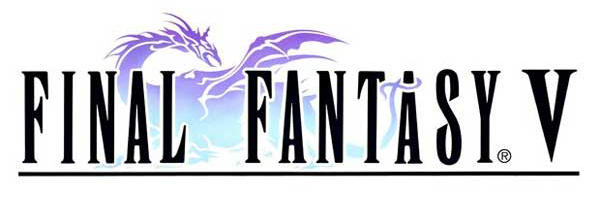
Final Fantasy V is this high up on the list for one reason: it has, by far the best implementation of the job system.
There are 22 different Jobs each character can learn, which is actually one fewer than in FF III, but in this case quality trumps quantity. Characters can be assigned jobs on the fly, as they could in Final Fantasy III, but this game goes a step farther. The reason Final Fantasy V’s job system is so good is that characters can carry their abilities over from one job to another. Want a black mage who can also use time magic? Level up time mage and have fun. Want a berserker who dual-wields battleaxes? Level up ninja until you get the 2-weapon skill. To add to the fun, a character’s freelancer job (the skilless starting class) is powered up with the highest stats of any jobs that character has mastered. For example, it could take the HP of the berserker class, the dexterity of the thief, and the magic power of the black mage, as well as any two job skills that character has learned. Overall, it leads to a lot of great mixing and matching to create your own dream class.
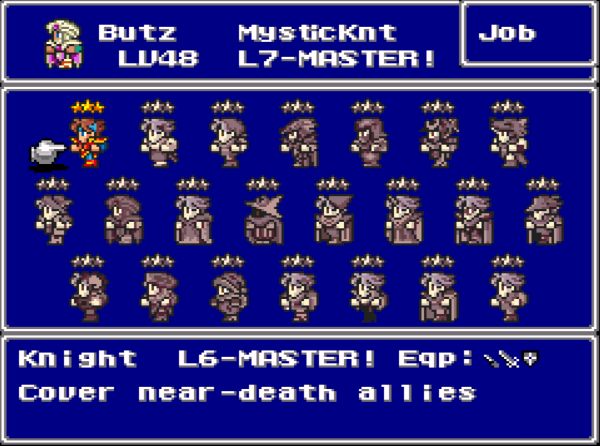
Aside from the fantastic job system - sadly the last time jobs were used in the main Final Fantasy series - the game is good. Not amazing, but good. The characters do have some depth; Faris in particular has a couple of surprises in store. The world is well-crafted and ripe for exploring, with more and more of it opening up as you get new means of transportation. While the end boss, Exdeath, is a pretty standard Mega-Evil Dark Wizard of Darkness and has a silly name (and also turns out to be a tree or something), he puts up a heck of a fight.
This game also introduced one of my favorite songs in the entire franchise. W hile it is the job system that pushes Final Fantasy V so far up, it’s a solid title all around.
#3: Keeping The Fayth
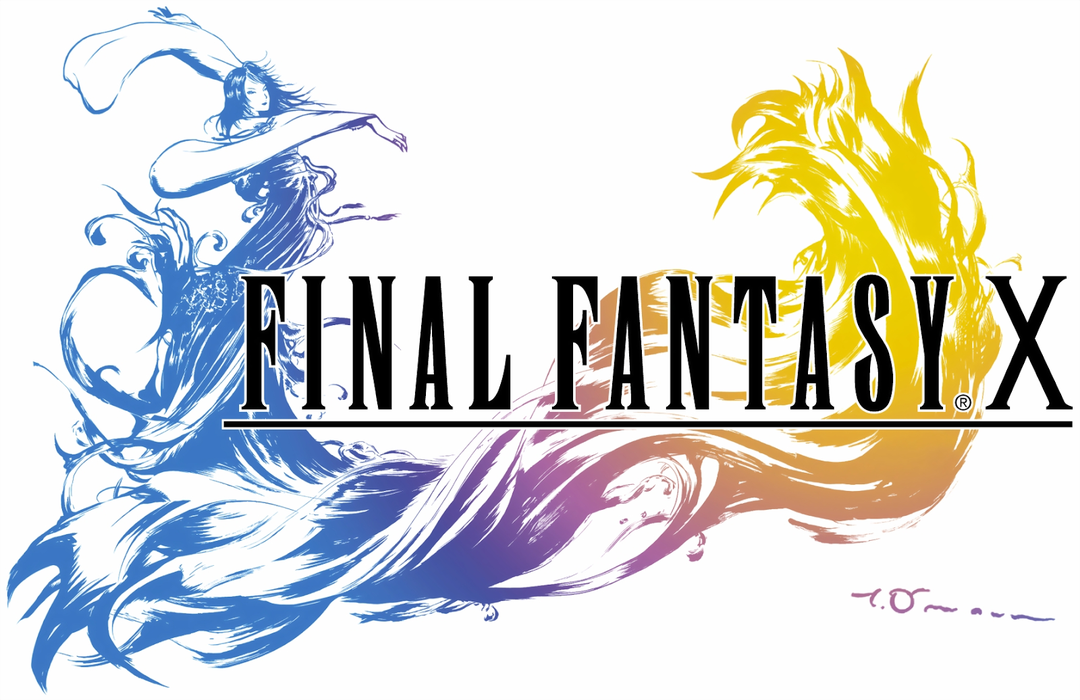
They got it right with this one. Final Fantasy X manages to take advantage of the Playstation 2’s capabilities in all the right ways. The graphics and music are great - just try to tell me that you don’t get chills when you hear To Zanarkand. The summon animations are impressive but keep to a reasonable length (mostly) and, even more importantly, they’re optional. Blitzball, Final Fantasy X’s signature minigame, is woven into the story and is a proper game unto itself, albeit a fairly simple one. That alone puts it in sharp contrast to FFVII’s penchant for tacking on silly little events wherever it could, or FFVIII and FFIX’s hastily-explained card games (I became the world champion of Tetra Master and I still don’t really know how it works).
The Sphere Grid was Final Fantasy X’s new level-up innovation, and it was a good one. Rather than just gaining stats as their levels went up, characters were given points to spend on a grid that they could travel along however the player wanted. More interestingly, all of the characters were on the same grid. So, for example, Auron started near a lot of physical attack boosts, while Yuna was near a lot of magic boosts, but in theory you could have Yuna make her way to Auron’s side of the grid and become a physical powerhouse herself. It was a fun addition to what was otherwise a fairly normal Final Fantasy setup.
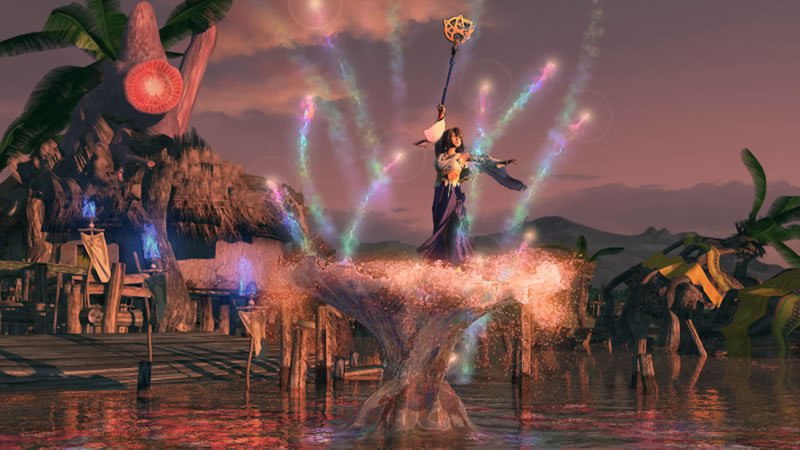
This was from the Remastered version, but the original game was very pretty as well.
I also particularly liked the summons in X. In this game, your summons would actually stick around and fight for you until they either ran out of HP or you dismissed them. Given that they were such a key part of the plot, it made sense that the Aeons would take a larger role in combat. It also made finding each new summon that much more exciting.
Obviously it’s important that a game be well-designed, but it also needs to be well-written, which this one certainly was. The mythology of Sin, the Aeons, and the Fayth is great (especially when it inevitably turns out to not be entirely true) and the characters all feel human, even the ones that aren’t. A couple of them did annoy me - looking at you, Wakka and Rikku - but I suppose that’s inevitable with such a range of personalities in one party.
Between Final Fantasy IX and Final Fantasy X, it really felt like Squaresoft had finally hit their stride with the Playstation systems. Of course, then they had to go and release Final Fantasy X-2, but let’s just leave that one where it lies.
#2: Perfecting The Basics
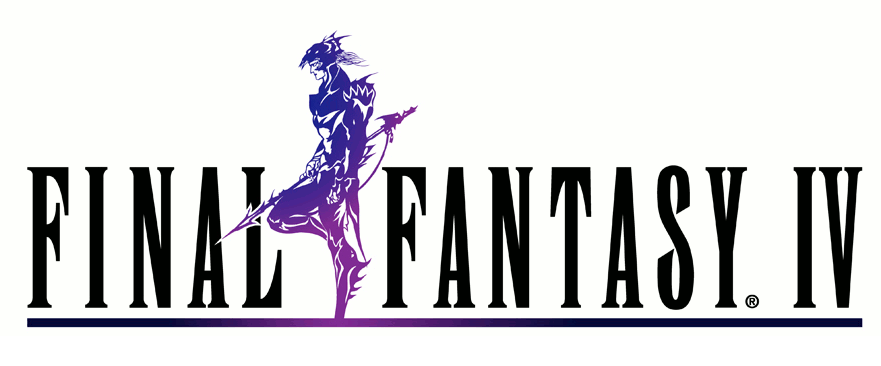
Given that a lot of this article has focused on the innovations and changes that made each game stand out, it seems strange to put Final Fantasy IV so far up the list. The truth is, what made this one stand out was just how great the story and characters really were.
Final Fantasy IV did not introduce much in terms of mechanics or gimmicks. It was a straightforward Final Fantasy game that played exactly how you’d expect one to. The characters weren’t customizable like they were in III and would be in V. Instead, each character had his or her own unique abilities, with enough variety that I never felt stifled. Characters ranged from a paladin (fighter with a splash of healing magic) to a powerful summoner, to a ninja master (because you always need a ninja master). It’s also helped out by the fact that your party changes frequently throughout the game as characters come and go.
An interesting side note, this is the only main-series game where you ever control five characters at once.
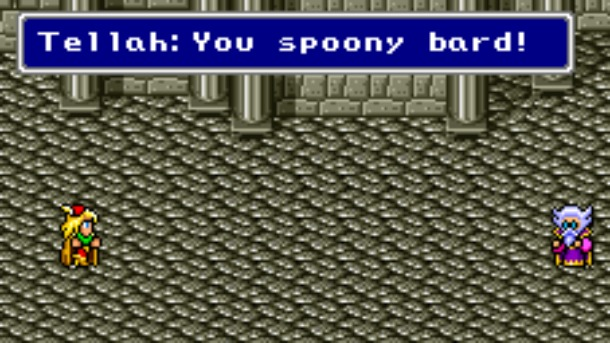
It also has this fantastic moment.
However, like I already said, what really makes Final Fantasy IV so good is just how well it’s written. You start out playing as Cecil, a dark knight of the kingdom of Baron, as he attacks another kingdom and steals their most valuable treasure. He and his friend Kain quickly realize that just maybe they might be on the wrong side of things here. What follows is both a personal story of redemption for Cecil and Kain, as well as a more typical save the Crystals, save the world scenario.
It’s the personal aspect that makes the story so good. The character writing was light-years ahead of Final Fantasy II and III, so add that to a story that really involves the characters as people, instead of just as fabled warriors of destiny, and you have a recipe for a great experience.
#1: The Perfection Of A Genre
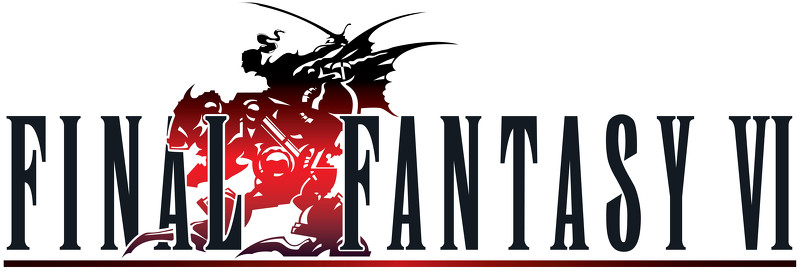
Okay, I’ll be the first to admit that there may be some bias at work here. This was the first Final Fantasy game I ever played, way back when it was released as Final Fantasy III for the SNES, and to this day it’s my favorite one by far.
Back when I first played this game, I’d never seen anything like it. The main characters weren’t just sprites that I used to kill other sprites; they were real characters with depth and backstory, and I actually cared about what happened to them. Every character had a history to discover, and a troubled past or a fatal flaw to overcome. The world wasn’t just a background for the action, it had its own rich history and was visibly impacted by what was happening. Kefka, the main villain, was an especially terrifying kind of insane, like a high fantasy version of the Joker. Everything about it was so great, and that was before the land broke apart and gave me a whole new world to explore.
Bad things happen in Final Fantasy VI, and that was a novel concept to ten year old me. Characters died - and not no-name NPCs who existed just to be killed, but characters I’d had time to get to know and love. I abandoned Shadow to die on the floating island when I felt that I couldn’t risk waiting any longer for him. I failed to save Cid when he was sick in bed, and as far as I knew he was the only other person still alive in a destroyed world. I watched Celes try to kill herself, only to fail and find her will to live again. And then, right when everything seemed lost, I got to fight back. It was heavy stuff, and I absolutely loved it. While Aeris' death in FFVII is perhaps more famous and iconic because it had a cut-scene, the story of it's predeccessor felt stronger and more cohesive.
It’s not just nostalgia that makes me adore this game so much, though. There are other games that make me nostalgic right up until I try to replay them (for example, any Digimon game), but Final Fantasy VI still holds up today. It’s great for all of the same reasons as IV, but even better still.
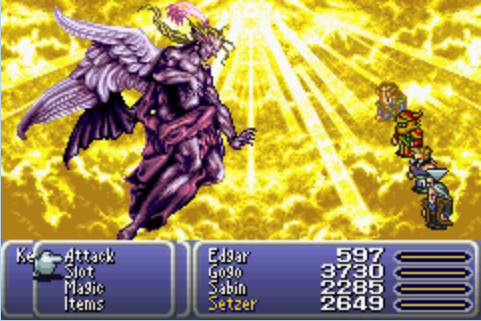
While VI doesn’t have a job system, it really doesn’t need it. Celes and Terra act like red mages (except that they’re good at it), Locke is a thief, Sabin is a monk, and so on. Plus, by the end almost every character can use magic to cover any weaknesses. I don’t remember ever getting stuck because I needed someone with powers that they didn’t have. Even when the plot demands that you play with certain characters, it’s good about making sure that you have at least one strong fighter and a healer. It doesn’t allow for as much customization as FFV, but the abilities that the characters do have just feel right.
The in-game world is pretty big too, and there’s a lot to explore. What I find especially cool is that you can - can, not should - go straight for the final area once you get your airship. It’s up to you how much you want to fly around, how many characters you want to save (or are able to), and how many powerful weapons and items you can find. You can explore the areas in any order you like, restricted only by how strong you need to be to survive them. Even then, it’s rare to run into something so overpowering that you can’t escape and teleport to safety. Then, whenever you think you’re ready, you can launch your attack on Kefka’s tower. I might not have known what an open-world game was back when I was ten, but I knew that it was unusual for a game not to railroad me to the next area, and I liked it.
I could go on for ages, but to sum it up: If there is such a thing as a perfect Final Fantasy game, it’s this one.
Closing Thoughts: A Series Worth Arguing Over
Just because something’s low on this list doesn’t mean I think it’s a bad game. I like - if not love - almost every title on this list; Final Fantasy is an incredible series. There’s a reason the franchise is still going strong today; there’s a reason why it’s survived through countless different iterations, spinoffs, sequels, and sequels of spinoffs.
Part of that reason is the story the games tell: Each is different, but they all speak to core values that a lot of people share. Things like courage, friendship and love, standing up for what’s right, and fighting to protect what’s important. Everyone wants to be a hero, and Final Fantasy lets you be just that.
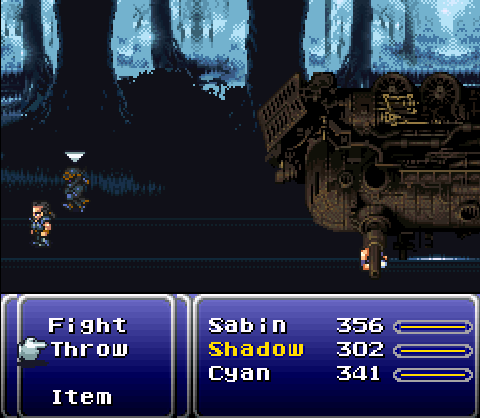
It also lets you suplex a train at one point. Everyone wants to do that...no? Just me?
Part of it is the characters. Everyone’s got a favorite Final Fantasy character (Celes is my waifu, get your own). Some of them are moody and withdrawn, some are bubbly and cheerful, some are warm and kind, some are stern and businesslike. Most have a lot more than that going on below the surface, waiting to be discovered. A Final Fantasy game isn’t just about the journey, it’s about who you take that journey with.
Part of it is the gameplay: Square’s attempts to keep the series fresh become apparent when you play the games one after the other like this. They keep changing things up, seeing what works and what doesn’t, and the result is a constantly evolving series where every installation has something new and exciting to offer.
Overall, though, it’s simply because they’re good games with loyal fanbases.
There are countless lists and rankings and arguments about which Final Fantasy is better than another and why. Sometimes the debates get pretty heated - people love to hate on the ones they don’t personally like, while holding up their own favorite as God’s gift to gaming. No doubt many of you, after reading this, will want to share your own favorite Final Fantasy games and why you love them so much.
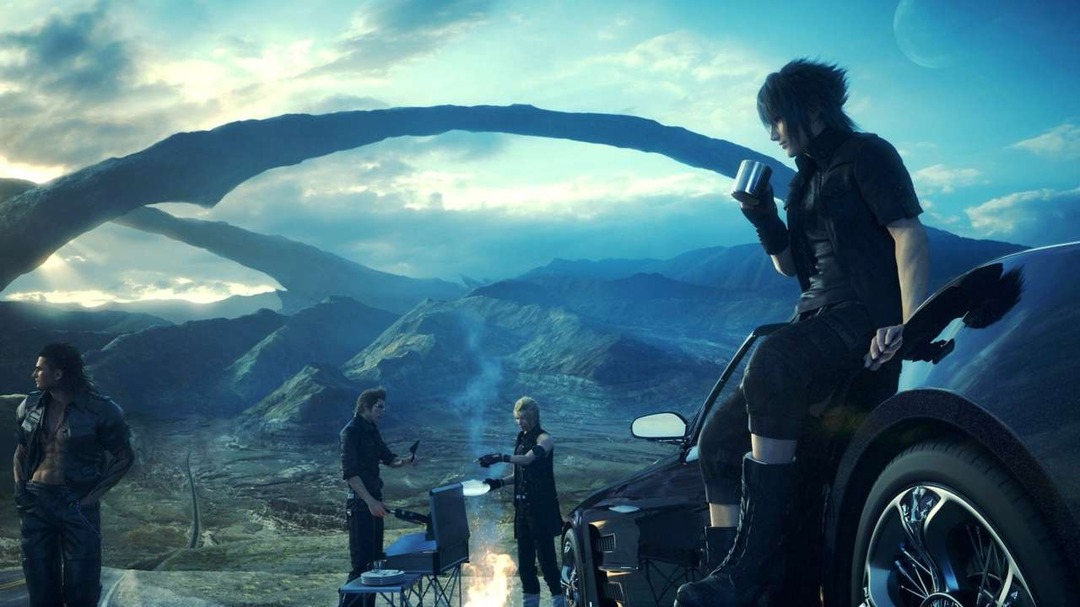
It's also a good time to look to the future. Final Fantasy XV just came out: what will it mean for new games in the series?
Just understand, the reason people get so worked up over these games is because they love them. In true Final Fantasy form, gamers will stand up to fight for what they believe in and defend what they love. That in itself should be enough to show the impact that Final Fantasy, one of video gaming’s longest-running and best-loved franchises, has had.
Well, let’s start the inevitable debate. What is your favorite Final Fantasy game? What’s your favorite battle? Why am I completely, indescribably, mind-blowingly wrong about Final Fantasy VII? Leave us a comment below! To see more articles like this, as well as keep up on all of our streaming and podcast shenanigans, you can follow us on Facebook!